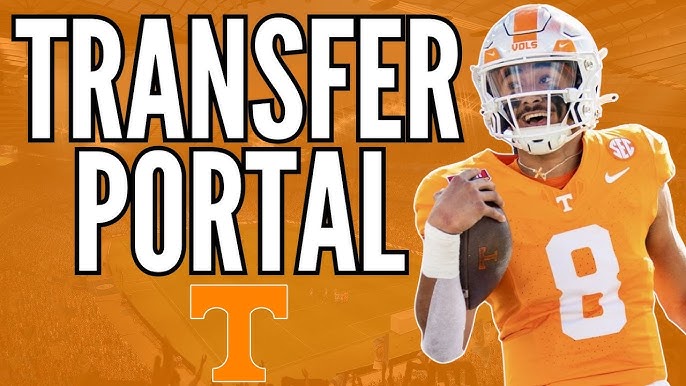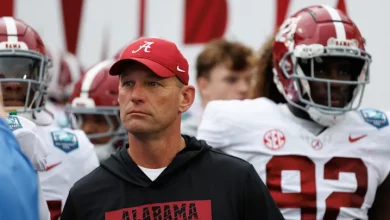Nico Iamaleava is officially in the transfer portal, marking the start of a new chapter in his football journey.

The transfer portal in college football has evolved into one of the most defining aspects of modern-day roster management, allowing athletes to change schools in search of new opportunities. For quarterbacks like Nico Iamaleava, the portal has become a platform to explore their future and chart a new path for their careers. On the heels of Iamaleava’s decision to enter the transfer portal, the college football world has been set ablaze with speculation about what this move means for his future and the programs vying for his services.
Nico Iamaleava, one of the most highly touted quarterbacks of his recruiting class, made waves in college football as he announced his intent to transfer from his current school. A former 5-star prospect, Iamaleava’s entry into the transfer portal is more than just a simple player movement; it represents a significant turning point in his career and the landscape of college football. But what led to this decision, and what does it mean for both Iamaleava and the teams that will likely court him?
The Rise of Nico Iamaleava
Nico Iamaleava’s story begins in the high school ranks, where he was a star quarterback at Long Beach Poly in California. A prototypical dual-threat quarterback, Iamaleava’s skill set made him one of the most sought-after recruits in the country. His ability to make pinpoint throws, combined with his athleticism and poise under pressure, quickly catapulted him to the top of the recruiting charts. He had the size (6’5”, 200 pounds), the arm strength, and the football IQ to succeed at the highest levels.
During his high school career, Iamaleava racked up impressive stats and accolades. He showcased his skills in elite 7-on-7 competitions and his high school’s regular season, earning national attention. The buzz surrounding his recruitment grew louder with each passing year, and it was no surprise when he became one of the most highly regarded quarterbacks in recent memory.
When it came time to decide on a college, Iamaleava had his pick of schools. His recruitment process was followed by fans, coaches, and analysts alike, all eager to see where this young star would land. After much speculation and a lengthy recruitment process, he ultimately committed to Tennessee, choosing the Volunteers over a slew of other elite programs.
At Tennessee, the expectation was high. Iamaleava’s raw talent had the potential to reshape the Volunteer offense, and he was brought in as the quarterback of the future. Early in his tenure at Tennessee, it was clear that his talents were undeniable, with the coaching staff tailoring the offense to fit his skills and allow him to develop into the star that many believed he could be.
However, despite his considerable potential, things didn’t always go according to plan. His tenure at Tennessee has been tumultuous, and now, with his decision to enter the transfer portal, questions are swirling about what led to his departure and what comes next.
The Transfer Portal Era: A New Dynamic
Before diving into the specifics of Iamaleava’s transfer, it’s important to understand the broader context of the transfer portal itself. The NCAA introduced the transfer portal to provide student-athletes with more freedom and flexibility when it comes to moving between programs. It was initially created to allow players who wanted to leave their current schools to do so without facing prohibitive penalties. In a short period of time, the transfer portal has completely altered the landscape of college sports.
For quarterbacks, in particular, the transfer portal has become a double-edged sword. On the one hand, it provides a fresh start and an opportunity to play at a new program. On the other hand, it introduces a level of unpredictability. The decision to enter the transfer portal is often tied to a complex set of factors, including playing time, coaching changes, scheme fit, and even personal or academic considerations.
For a high-profile player like Iamaleava, the portal offers an opportunity to rechart the course of his career. While the situation at Tennessee may not have played out as he initially hoped, the portal opens up a host of possibilities for him to explore. With his skill set, it’s likely that numerous top-tier programs will vie for his services.
Reasons Behind Iamaleava’s Decision to Transfer
So, why did Iamaleava choose to enter the transfer portal? There are several possible factors at play, each contributing to his decision.
Playing Time and Development
The most obvious reason why many players enter the transfer portal is the pursuit of more playing time. Iamaleava’s decision to transfer comes at a time when he may be facing increased competition for the starting quarterback role at Tennessee. While he showed flashes of brilliance, his consistency was at times lacking, and the team’s overall success during his tenure could have played a role in his decision.
As a 5-star recruit, Iamaleava is undoubtedly eager to prove himself as one of the best quarterbacks in the country. For him to achieve that, he likely feels that he needs to be the starter at a program where he can get more reps and develop more rapidly. If he didn’t see that opportunity materializing at Tennessee, the transfer portal provided the perfect opportunity to look for a better situation where his talents could be better showcased.
Coaching and Scheme Fit
Another factor that may have influenced Iamaleava’s decision is the coaching situation at Tennessee. College football teams are constantly evolving, with coaches coming and going as programs rise and fall in the rankings. Tennessee has undergone significant changes in recent years, and it’s possible that Iamaleava felt the need for a change in coaching philosophy to best maximize his abilities.
Offensive schemes and coaching staff dynamics play a huge role in a quarterback’s development. If Iamaleava felt that Tennessee’s offense wasn’t the best fit for his talents or that the coaching staff’s direction wasn’t aligned with his aspirations, seeking a new environment could have seemed like the best move for his future.
The Pressure of Expectations
The expectations placed on Iamaleava were immense when he first arrived at Tennessee. As one of the top quarterback prospects in the country, he was expected to lead the Volunteers back to prominence in the SEC. That kind of pressure can be both motivating and overwhelming. After a series of underwhelming results, it’s possible that Iamaleava felt the need for a fresh start away from the heavy weight of those expectations.
Personal Considerations
As with any major decision, personal factors could also be at play. College athletes, particularly those at the quarterback position, face immense stress both on and off the field. The transfer portal offers players a chance to move to a school where they feel they can thrive—not just as athletes, but as people. Whether it’s a desire to be closer to family, find a better academic fit, or simply a yearning for a change of scenery, personal factors can sometimes weigh just as heavily as football considerations.
What’s Next for Iamaleava?
Now that Iamaleava is in the transfer portal, the next chapter of his career begins. What are the potential landing spots for the talented quarterback, and what kind of programs will be interested in him?
Given Iamaleava’s pedigree, it’s likely that several top programs will enter the mix. Schools with a need at quarterback and the ability to offer him an immediate starting role are probably at the top of his list. As a highly skilled dual-threat quarterback, Iamaleava is a perfect fit for offenses that emphasize versatility and mobility in their signal callers.
Programs with established quarterbacks may be less likely to pursue him, but schools in need of an upgrade at quarterback or those with a desire to build around a young, talented player could make a strong push to land him. SEC schools, in particular, may look to add Iamaleava to their roster, given his familiarity with the conference and his skill set.
In terms of what Iamaleava needs from his next stop, the most important factor will be finding a place where he can get immediate playing time, where the offensive system suits his style, and where he feels comfortable as both a leader and a student-athlete.
The Impact on Tennessee
While Iamaleava’s departure is certainly a blow to Tennessee, the Volunteers are no strangers to high-level quarterback play. Tennessee has a strong recruiting pipeline and will likely look to find another quarterback who can step in and lead the team moving forward. While losing Iamaleava is disappointing, Tennessee’s deep roster and commitment to winning means they will quickly pivot and try to build a successful offense with or without him.
Head coach Josh Heupel’s offensive system has been one of the most explosive in college football, and it’s possible that Tennessee will continue to recruit and develop quarterbacks who can thrive in that high-tempo, dynamic attack.









